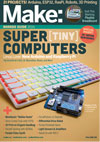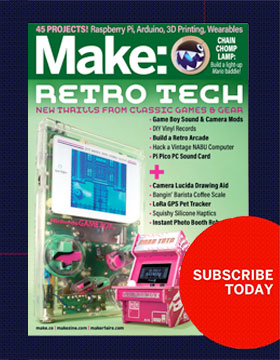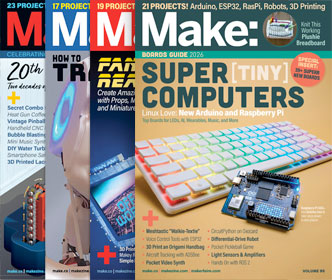

The June theme for Make: Online is “Physical Science and Mechanics.” Physical science is a broadly used term that can be applied to the study of any non-living systems and how they interact, from the foundational physical laws of energy, matter, and force to the basic principles of simple machines (lever, pulley, inclined plane, wedge, screw, gear). The term is also applied to chemistry and Earth sciences, and from there, it becomes leaky with the living, the biological. For our coverage, we’ll stick to it as it applies to simple machines, basic laws of physics, and how they become the complex mechanical systems that surrounds us.
Now you may think that such coverage is a little rudimentary for MAKE, the sort of foundational knowledge we all should have long-ago absorbed in grade school. But I think that’s part of the problem. Understanding these basics is something that some folks may not have paid much attention to in school, but now they’ve become makers and they have holes in their knowledge, gaps they may be too embarrassed to admit to. Understanding basic physical properties, simple machines, basic mechanics can go a long way toward being able to understand, troubleshoot, design, and build more complex machines.
I suspected that Make: Electronics was likely to be a big success because I knew there was a dearth of clear, well-organized, plain English content explaining the rudimentary principles of electronics so that mortals could understand them. Similarly, I think a lot of people don’t know, for instance, how gear trains work and how to figure out gear ratios for building a vehicle drive train, or how to effectively use a block and tackle to safely move a load, or how stresses, load-bearing, friction, pressure, and other forces effect the integrity of objects. These are the sorts of mechanical concepts and skills every maker should know.
We’re looking forward to seeing how we can cover all of this in a fun, creative way, from talking to kinetic sculptors, to rounding up some of the best physical science content we’ve published previously (here and in the magazine), to original feature articles covering various aspects of physical science and mechanics.
As always, we’d love your input. If there’s something you’d like for us to cover, or you have some special knowledge in this area, or if there are any key resources, tutorials, etc. that you think we should include, please send them along. Thanks!

Table of simple mechanisms, from Chambers’ Cyclopedia, 1728.
12 thoughts on “Physical sciences and mechanics month”
Comments are closed.
ADVERTISEMENT
Join Make: Community Today










Here’s a slim volume to kick off with, then; Henry T Brown’s 507 Mechanical Movements, Mechanisms and Devices, long out of copyright and so legal to download for free:
http://www.archive.org/details/fivehundredseven00browiala
As said some may have been a little distracted during those lessons, but I’m not entirely convinced that is entirely the problem. When I look back at what I learned in school, not all of the things you mentioned were even mentioned. While ideas like forces acting on objects on slopes, cams, gears etc were taught, ideas such as pulleys etc were not covered in any great detail. One memory that sticks with me is the first mention of pulleys which occurred during a mock exam paper only a matter of weeks before the real thing. Aside from that question, nothing was ever mentioned until a year or so later on a different course (A physics course, not a systems course designed to teach these ideas). So while these basics should be taught, they simply are not in some places. A great disappointment indeed. I’m sure many will agree however when I say that it is never too late to learn these skills. I for one look forward to seeing what new skills I may learn from this months theme!
Nice post, John. And I agree. I didn’t learn all of that stuff in high school either, because 1) some of it just wasn’t taught, and 2) I wasn’t very interested in it at the time. I took Intro to Physical Science in the 8th grade (?) I think it was, and it wasn’t bad, but I was so girl-crazy at the time and my lab partner was really hot and used to wear really short skirts. So for years, whenever I thought of physical science, the only thing that came to mind was LEGS. It was only as an adult that I really started to become interested in mechanical engineering and how the physical world worked.
I’m so happy Make is covering mechanics this month and hope to offer part of the solution. At the risk of sounding self-promotional, I’ve been teaching a class on exactly this topic for four years at NYU’s ITP program, and am currently writing a book for McGraw-Hill based on the class called Making Things Move (available for pre-order on Amazon now). The companion website, http://www.makingthingsmove.com, will also have a lot of information that compliments the print version. I hope this will help!
The comments have been interesting about the need for knowledge such as mechanisms. Much of it is, indeed, included in schools – especially in courses called Technology Education. Those programs are worldwide and they are are a perfect match for Makers!
Many Technology educators use an approach called “core technologies” and with topics organized in families such as mechanisms, electrical, electronics, controls, etc. Those core skills are usually then combined with real-world problem-solving projects. Sort of sounds like Make, doesn’t it?
Some resources that we used and you may find useful are a series of books from the UK; called Modular Courses in Technology. They are small, friendly books on the following subjects: energy, electronics, mechanisms, structures,problem solving, materials, pneumatics,instrumentation, optical applications, digit electronics, & aeronautics.
Each book includes brief explanations, lots of photos and illustrations, and sample projects.
They were published as Design & Technology textbooks in the early to mid-Eighties by Oliver & Boyd in association with the National Centre for School Technology.
We’d like to have a poster of the “table of simple mechanisms ”
for our daughter’s work room…any idea where we could get one?